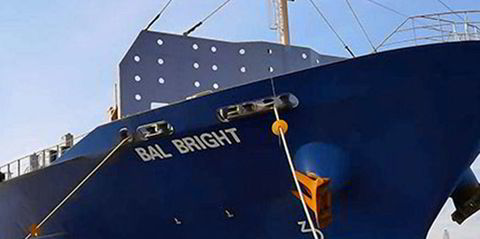The six dry bulk stocks under the coverage of investment bank Jefferies are trading at an average of 63% of their net asset value, with Golden Ocean Group (75%) and Star Bulk Carriers (72%) the best of the group.
One potential takeaway from those numbers is that investors aren’t assigning much value to the management teams of these listed owners.
VesselIndex returns
Another possible conclusion is that they are assigning a negative value to these C-suite executives.
So it’s at an interesting time for Danish researchers Anders Liengaard and Soren Roschmann to come along with their annual VesselIndex Report on the relative performance of 23 listed dry trade owners and operators, shared exclusively with Streetwise.
At first blush, it appears maybe the investors are not giving these management teams a fair shake.
For example, the companies surveyed outperformed the relative Baltic indices for bulker classes by an average 11% during 2022, with 16 beating the benchmarks.
As usual, though, it’s worth delving a little deeper into the numbers.
Liengaard pointed out in an interview this week that the companies were navigating a falling market over the course of the year, and that sets up certain predictable results.
Owners are better able to beat the Baltic standards in such a market, especially those who have put away some tonnage under charter coverage.
And indeed the opposite is true when the year features a rising market: only two of the 21 companies surveyed outperformed the indices in 2021.
“In a rising market, it’s difficult to outperform because we use the Baltic indices — you’re always playing a game of catch-up,” Liengaard said.
“In the same way, we would have expected the companies to outperform a falling market in 2022, and that largely did happen.”
OK, so maybe Liengaard and Roschmann aren’t here to say the investors are wrong after all.
But for the first time they have included a more long-term look at performance over the five years they have done the survey, and that is something to which investors might want to pay attention.
Of the 27 public owners reviewed on that basis, 14 beat the Baltic benchmarks, with the remainder underperforming. But more than half of the field registered rates within $1,000 per day of the relevant indices.
The top five performers since 2018 were Pangaea Logistics Solutions (34.4% rates premium), Klaveness Combination Carriers (24.7%), Thoresen Thai Agencies (18.1%), Pacific Basin Shipping (17.1%) and Norden (13.7%).
Others with an average outperformance were Castor Maritime (8.3%), Golden Ocean Group (8%), Great Eastern Shipping (7.8%), Belships (5.7%), EuroDry (5.5%), Eagle Bulk (5.5%), Grindrod (5.1%), Safe Bulkers (3.1%), Precious Shipping (0.9%) and Genco Shipping & Trading (0.3%).
Pangaea and Pacific Basin are the only companies to have outperformed in all five years.
The five worst performers over the period were Uni-Asia Shipping (-22%), Globus Maritime (-18.6%), Malaysian Bulk Carriers (-9%), Jinhui Shipping & Transportation (-8.7%) and Seanergy Maritime (-6.9%).
Others with average negative performance over the period were GoodBulk (-5.6%), 2020 Bulkers (-3.9%), Diana Shipping (-3.6%), Navios Maritime Partners (-3.1%) and Star Bulk Carriers (-1.5%).

Globus and Jinhui were the only companies to underperform in all five years.
“I think the five-year chart is quite interesting,” Liengaard said. “A lot of companies can explain why they have a huge outperformance or underperformance in a given year. But if you look over several years, it tells you something about how good this company is at running assets.”
Results for 2022
Still, VesselIndex has again determined the winners and losers when it comes to the single year that was 2022, and the results contain a surprise or two.
For only the second time since the survey began, New York-listed niche cargo expert Pangaea was not the top performer. Pangaea had topped the list three straight years before coming a close second to Pacific Basin for 2021.
The 2022 champion is Klaveness, which logged a gaudy 64% return to the indices.

However, the Klaveness placing may prove controversial, as all 16 vessels in its fleet are able to carry both dry and wet cargoes. That makes the Oslo company the biggest outlier in the five years of the dry bulk survey, as it benefited from a surging wet market.
“Being able to reap the benefits from the two worlds must make every shipowner’s dream come true, however, it is worth mentioning that combination carriers are specialised tonnage which comes with a higher price tag from the yard,” the researchers write in the survey.
Liengaard acknowledged to Streetwise that there was some debate about whether to include Klaveness. In the end, the analysts decided its status was somewhat similar to that of Pangaea, which is able to reap higher rates from its pricier ice-class fleet, albeit on purely dry cargoes.
The year’s biggest recovery story came from New York-listed Diana, which came second last year with a 28.7% outperformance after finishing dead last for 2021. Again, it was a matter of Diana’s charter-laden fleet retaining higher rates as the spot market plummeted.
Pangaea nipped Pacific Basin for third with a premium of 25.4% to 25.2%, while Thoresen Thai (22.6%) took fifth.
At the opposite end, Jinhui fell 8.5% below Baltic indices, followed by 2020 Bulkers (-7.6%), Globus (-7.3%), Belships (-2.6%) and Precious (-2.3%).
More ship finance news
Eagle Bulk Shipping has agreed with lenders on a $175m enlargement of its current credit facilities that pushes maturities back two years into 2028. Click here to read.
Hauled back from the brink of bankruptcy under a $2.2bn debt mountain in 2018, Danaos Corp expects to have no net debt at all this year. “We expect to be net debt-free in a matter of two or three months,” chief financial officer Evangelos Chatzis told analysts. Click here to read.
Norwegian banker Jan Ole Huseby says shipping is coming up way short on its decarbonisation investments so far. But the head of global ocean industries at DNB said his bank is here to help. Click here to read.




